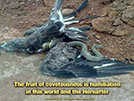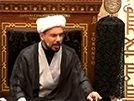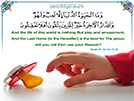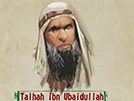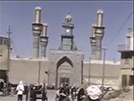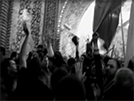Letter 54
- Details
- Hits: 3825
Letter 54
Glitters of Ahadith Relevant to the Ghadir Incident
Muharram 18, 1330
Relying on the consensus of narrators of hadith, al-Tabrani and many others[1] have quoted Zayd ibn Arqam saying:
"The Messenger of Allah, peace be upon him and his progeny, once delivered a sermon at Ghadir Khumm under the shade of a few trees saying, `O people! It seems to me that soon I will be called upon and will respond to the call.[2] I have my responsibility[3] and you have yours;[4] so, what do you say?' They said: `We bear witness that you have conveyed the Message, struggled and advised [the nation]; therefore, may Allah reward you with the best of His rewards.' He asked them: `Do not you also bear witness that there is no god but Allah and that Muhammad is His Servant and Messenger, that His Paradise is just and that His Fire is just, that death is just, that the life after death is just, that the Hour will undoubtedly approach, and that Allah shall bring the dead to life from their graves?' They said: `Yes, indeed, we do bear witness to all of that.' He said: `O Mighty Lord! Bear witness that they have.' Then he said: `O people! Allah is my Master, and I am the mawla (master) of the believers.
I have more authority over their lives then they themselves have;[5] therefore, to whomsoever I have been a mawla, this (`Ali) is his mawla;[6] O Lord! Befriend whoever befriends him, and be an enemy of whoever sets himself as his enemy.' Then he said: `O people! I am to precede you, and you shall join me, at the Pool [of Kawthar] which is wider than the distance from Basra to San`a; it contains as many silver cups as the stars; and I shall ask you when you join me about the Two Weighty Things, how you shall succeed me in faring with them; the Greatest Weighty Thing is the Book of Allah, the Omniscient, the Sublime, one end of which is in Allah's hand and the other in yours; so, uphold it so that you may not go astray, and your faith shall not suffer any alteration; and the other are my Ahl al-Bayt, for the most Gracious and Knowing has informed me that they both shall never part from each other till they join me at the Pool.'"[7]
In a section dealing with `Ali's virtues in Al-Mustadrak, the author indicates that Zayd ibn Arqam[8] is quoted through two sources both of which are held reliable by both Shaykhs: al-Hakim [one of such sources] says that when the Messenger of Allah, peace be upon him and his progeny, returned from his Farewell Pilgrimage, he camped at Ghadir Khumm and ordered the believers to sweep the area under a few huge trees where a pulpit of camel litters was made for him. He stood and said: "It seems as if I have been called upon and responded to the call, and I enjoin you to look after both the Book of Allah and my Progeny; see how you fare with them after me, for they shall never part from each other till they join me at the Pool." Then he added: "Allah, the Dear and Mighty, is my Master, and I am the master of every believer," then he took `Ali by the hand and said: "To whomsoever I have been a master, this `Ali is [henceforth] his master; O Lord! Befriend whoever befriends him, and be the enemy to whoever antagonizes him." The author quotes this lengthy hadith in its entirity. In his Talkhis, al-Thahbi quotes it without commenting on it. Al-Hakim, too, quotes it as narrated by Zayd ibn Arqam in his Al-Mustadrak, admitting its authenticity. In spite of his intolerance, al-Thahbi admits the same in his Talkhis, to which you may refer.
Imam Ahmed ibn Hanbal has quoted the same hadith as narrated by Zayd ibn Arqam thus:
"We were in the company of the Messenger of Allah, peace be upon him and his progeny, when he camped in a valley called Wadi Khumm, and he ordered everyone to gather for prayers in midday heat. He then delivered a sermon to us under the shade of a robe over a rush tree [Juncus spinosus] to protect him from the heat of the sun. He said: `Do you know - or do you bear witness - that I have more authority over a believer's life than the believer himself has?' They answered: `Yes, indeed, you do.' He said: `Whosoever accepts me as his mawla, `Ali is his mawla; O Lord! Befriend whosoever befriends `Ali and be the enemy of whomsoever opposes `Ali.'"
Al-Nisa'i quotes Zayd ibn Arqam saying that when the Prophet (pbuh) returned from the Farewell Pilgrimage, and having reached Ghadir Khumm, he ordered the ground under a few huge trees to be swept clean. He announced: "It looks like I have been invited [to my Lord's presence] and I have accepted the invitation, and I am leaving with you the Two Weighty Things, one of them is bigger than the other: the Book of Allah and my Progeny, my Household; so, see how you succeed me in faring with both of them, for they shall never part from each other till they join me at the Pool." Then he added: "Allah is my Master, and I am the master (mawla) of every believer." Taking `Ali's hand, he added saying, "To whomsoever I have been a master, this `Ali is his master; O Lord! Befriend those who befriend him, and be the enemy of all those who antagonize him." Abul-Tufail says: "I asked Zayd: `Have you heard these words of the Messenger of Allah, peace be upon him and his progeny, yourself?"[9] He answered that all those who were there under the huge trees had seen the Prophet with their own eyes and heard him with their own ears. This hadith is recorded by Muslim in a chapter on the attributes of `Ali in his Sahih from several different narrators ending with Zayd ibn Arqam, but he abridged it and cut it short - and so do some people behave.
Imam Ahmed has recorded this hadith from al-Bara' ibn `Azib[10] from two avenues saying; it reads: "We were in the company of the Messenger of Allah (pbuh) when we camped at Ghadir Khumm. The call for congregational prayers was made. The site of two trees was chosen, and it was swept clean. He performed the noon-time prayers then took `Ali by the hand and asked the crowd: `Do you not know that I have more authority over the believers than the believers themselves have?' They answered: `Yes, we do.' He asked: `Do you know that I have more authority over every believer than the believer himself has?' They answered in the affirmative; then he took `Ali's hand and said: `Whoever has accepted me as his master, this `Ali is his master; O Lord! Befriend whoever befriends him and be the enemy of whoever chooses to be his enemy.' `Umer met him immediately following that and said to him: `Congratulations to you, son of Abu Talib! You have become, at dawn and at sunset, the master of every believing man and woman.'"
Al-Nisa'i has quoted `Ayisha daughter of Sa`d saying that she heard her father saying: "I have heard the Messenger of Allah, peace be upon him and his progeny, on the Day of Juhfa, when he took `Ali's hand and delivered a sermon, praised and adored Allah, then said: `O people! I am your wali.' They said: `You have said the truth.' Then he raised `Ali's hand and said: `This is my wali unto you to discharge the responsibilities of my religion on my own behalf, and I support whoever supports him and am the enemy of whosoever chooses to be his enemy.'"
Sa`d is also quoted saying: "We were in the company of the Messenger of Allah (pbuh). When he arrived at Ghadir Khumm, those who went ahead of him returned to join him, while he waited for those who lagged behind, till all people assembled. Then he said: `O people! Who is your wali?' They answered: `Allah and His Messenger.' Then he took `Ali's hand, made him rise and said: `Whoever has taken Allah and His Messenger as his wali, this (`Ali) is his wali; O Lord! Befriend whoever befriends him and be the enemy of whoever chooses to be his enemy.'"
The books of traditons recording this incident are numerous and cannot be all cited here. They all contain explicit texts indicating that Ali is the Prophet's vicegerent and successor, just as al-Fadl ibn al-Abbas Abu Lahab has said:[11]
The one to be recognized as the Vicegeret, generation after generation,
After Muhammad, is `Ali; for he was his companion in every occasion.
Sincerely,
Sh
-----------------------------------
[1] Many renown authorities have admitted its authenticity, so much so that even Ibn Hajar stated the same, quoting al-Tabrani and others, in the shubha (allegation) number 11 of the ones which he enumerates on page 25, Section 5, Chapter One, of his book Al-Sawa`iq al-Muhriqa.
[2] He has eulogized his own pure soul simply to attract their attention to the fact that time had come to bring his mission to perfection, necessitating the appointment of his successor, and that he is unable to postpone doing so for fear he might be called upon [i.e. die] before discharging such mission which he is to bring to perfection, a mission that is indispensable to his nation.
[3] Since the appointment of his brother weighs heavily against those who compete, envy, create dissension and hypocrisy, he, peace be upon him and his progeny, desired, before making such an announcement, to first apologize to them in the hope that that might touch and unify their hearts and in apprehension of their speeches and deeds; he said: "And I am responsible," so that they might come to know that he receives orders, and that he is responsible to discharge them; therefore, he simply has to do so. Imam al-Wahidi, in his book Asbabul Nuzul, quotes Abu Sa`id al-Khudri saying: "The verse `O Messenger! Convey that which has been revealed unto you from your Lord' was revealed on Ghadir Khumm day in reference to `Ali ibn Abu Talib (as)."
[4] By saying "You, too, are responsible," he, peace be upon him and his progeny, may have implied, as quoted by al-Daylami and others and stated in Al-Sawa`iq al-Muhriqa and other books from Ibn Sa`id, that they should follow in their footsteps, since they are responsible regarding `Ali's wilayat. Imam al-Wahidi has said: "They are responsible regarding the wilayat of `Ali and Ahl al-Bayt." Thus, the purpose of his saying "and you, too, are responsible" is to threaten those who would dispute the authority of his wali and wasi.
[5] Many have contemplated upon this sermon, giving it due attention, and they have come to know that its gist is nothing other than a reference to the fact that `Ali's wilayat is as much a root of the faith as his own responsibility as the Imam, for the Prophet (pbuh) first put the question: "Do not you bear witness that there is no god but Allah, and that Muhammad is His Servant and Messenger?" Then he said: "The Hour is approaching; there is no doubt about it, and Allah shall certainly bring to life those who are in the graves," following that with a statement in which he mentioned the wilayat so that it would be understood that the latter bears the same significance like the matters about which he has asked them and to which they have agreed. This is obvious to all the discreet who are familiar with the methods and objectives of speech.
[6] His statement: "I am the mawla" is an outspoken testimony to a significant fact. The meaning of "mawla" is: one who is "awla," foremost in status, superior. Thus, the meaning of his statement is: "Allah is superior to me, and I am superior to the believers, and whoever considers me to be superior to him must also consider `Ali as such."
[7] This wording of the hadith is quoted by al-Tabrani, Ibn Jarir, al-Hakim al-Tirmithi, from Zayd ibn Arqam. It is transmitted by Ibn Hajar from al-Tabrani and others in this exact wording, without questioning its authenticity; so, refer to page 25 of Al-Sawa`iq al-Muhriqa.
[8] Refer to page 21 of Al-Khasa'is al-`Alawiyya, where the Prophet (pbuh) is quoted saying: "To whomsoever I have been the wali, this (`Ali) is his wali.
[9] Abul-Tufayl's question is obviously indicative of his amazement at this nation's overlooking this matter regarding `Ali in spite of the hadith it narrates from its Prophet (pbuh) in his honor on the day of the Ghadir. As if suspicious of the accuracy of the narrated hadith, he went ahead and inquired of Zayd, having heard him narrate the same, "Did you hear it from the Messenger of Allah?!" His tone is that of someone amazed, bewildered, and skeptical. Zayd answered him that all individuals present under those trees had, indeed, seen the Prophet with their eyes and heard him with their ears; so, Abul-Tufayl then knew that the matter was just as al-Kumait, may Allah be merciful unto his soul, says:
On the day of the dawh, the dawh of the Ghadir,
Caliphate was made for him manifest and clear,
Only if the throngs opted to obey;
Yet I have never seen such a day,
Nor have I seen such right
Trampled upon, discarded outright;
But the men had sold it, and I never saw
Such a precious thing to sale would go...
[10] This occurs on page 281 of his Al-Khasa'is al-`Alawiyya, in a chapter dealing with `Ali's status in the eyes of Allah, the Exalted, the omni-Scient, and also on page 25 of another chapter enjoining acceptance of his wilayat and warning against bearing animosity towards him.
[11] These are among poetic lines composed as the answer of al-Walid ibn `Uqbah ibn Abu Ma`it, quoted by Muhammad Mahmud al-Rafi`i in his Introduction to Sharh al-Hashimiyyat, page 8.

